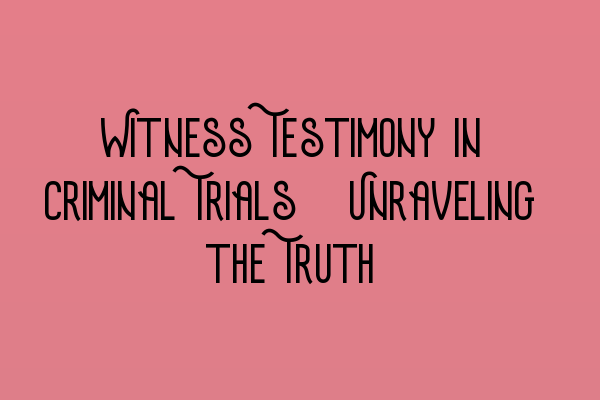Witness Testimony in Criminal Trials: Unraveling the Truth
In the realm of criminal law, the reliability of witness testimony plays a pivotal role in determining the guilt or innocence of an individual accused of a crime. It serves as one of the primary sources of evidence presented during a criminal trial, offering firsthand accounts of the events in question. However, despite its significance, witness testimony can be a complex and nuanced subject.
When evaluating witness testimony, the legal system seeks to separate truth from falsehood. It is the responsibility of criminal lawyers and the court to carefully analyze the credibility of witnesses, considering factors such as motive, bias, memory accuracy, and the potential for inaccuracies or fabrication.
Factors Affecting Witness Testimony:
Various factors can influence the accuracy and reliability of witness testimony. One significant factor is the effect of emotions and stress on memory recall. Strong emotional experiences, such as witnessing a violent crime, can impact a person’s ability to accurately recall events. This underscores the need for skilled criminal lawyers to appropriately handle and present witness testimony during a trial.
Cross-examination is another essential aspect of evaluating witness testimony. Through skillful questioning, defense lawyers may uncover inconsistencies or contradictions in a witness’s account, weakening their credibility. Lawyers, trained in the art of cross-examination, can employ various techniques to test the veracity of a witness’s testimony.
Another influential aspect is the reliability of eyewitness identification. Research has shown that human memory is fallible, and witnesses may inadvertently make mistakes when identifying a suspect. Understanding how memory works and the potential for misidentification is crucial in ensuring a fair trial.
Furthermore, expert witness testimony can provide valuable insights into technical or scientific aspects of a case that may be beyond the comprehension of the average juror. Expert witnesses, such as forensic scientists or medical professionals, can help elucidate complex evidence and clarify any misconceptions.
Challenges and the Way Forward:
Despite the careful evaluation and consideration of witness testimony by the legal system, challenges persist. Some witnesses may have ulterior motives, harboring biases or prejudices that could influence their testimony. Additionally, memory decay and distortion over time can further complicate the reliability of witness accounts.
As technology continues to advance, new tools and techniques are being developed to enhance the accuracy of witness testimony. For example, video recordings, forensic evidence, and other modern methods help corroborate or challenge witness accounts, adding an extra layer of objectivity.
In conclusion, witness testimony remains a vital part of criminal trials. It is an intricate dance between the truth-seeking pursuit of justice and the complexities of human memory and perception. Lawyers, armed with legal expertise and the ability to analyze and challenge witness testimony, play a crucial role in ensuring a fair and just legal process.
At SQE Criminal Law & Practice Law UK, we provide comprehensive SQE 1 preparation courses and SQE 2 preparation courses to equip aspiring lawyers with the necessary skills and knowledge to excel in their legal careers. Stay prepared with our practical SQE 1 practice exam questions and SQE 1 practice mocks FLK1 FLK2 for a successful SQE exam experience. For more information about SRA SQE exam dates, visit our SRA SQE exam dates page.
